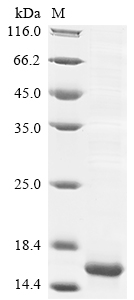Recombinant Mouse Insulin-like growth factor II (Igf2)
CAT:
399-CSB-EP011088MO-03
Size:
1 mg
Price:
Ask
- Availability: 24/48H Stock Items & 2 to 6 Weeks non Stock Items.
- Dry Ice Shipment: No




Recombinant Mouse Insulin-like growth factor II (Igf2)
- CAS Number: 9000-83-3
- Gene Name: Igf2
- UniProt: P09535
- Expression Region: 25-91aa
- Organism: Mus musculus
- Target Sequence: AYGPGETLCGGELVDTLQFVCSDRGFYFSRPSSRANRRSRGIVEECCFRSCDLALLETYCATPAKSE
- Tag: N-terminal 6xHis-tagged
- Source: E.coli
- Field of Research: Signal Transduction
- Assay Type: In Stock Protein
- Relevance: The insulin-like growth factors possess growth-promoting activity. Major fetal growth hormone in mammals. Plays a key role in regulating fetoplacental development. IGF-II is influenced by placental lactogen. Also involved in tissue differentiation. Positively regulates myogenic transcription factor MYOD1 function by facilitating the recruitment of transcriptional coactivators, thereby controlling muscle terminal differentiation. In adults, involved in glucose metabolism in adipose tissue, skeletal muscle and liver. Acts as a ligand for integrin which is required for IGF2 signaling.
- Purity: Greater than 85% as determined by SDS-PAGE.
- Activity: Not Test
- Length: Full Length of Mature Protein
- Form: Liquid or Lyophilized powder
- Buffer: If the delivery form is liquid, the default storage buffer is Tris/PBS-based buffer, 5%-50% glycerol. If the delivery form is lyophilized powder, the buffer before lyophilization is Tris/PBS-based buffer, 6% Trehalose, pH 8.0.
- Reconstitution: We recommend that this vial be briefly centrifuged prior to opening to bring the contents to the bottom. Please reconstitute protein in deionized sterile water to a concentration of 0.1-1.0 mg/mL.We recommend to add 5-50% of glycerol (final concentration) and aliquot for long-term storage at -20℃/-80℃. Our default final concentration of glycerol is 50%. Customers could use it as reference.
- Molecular Weight: 13.4 kDa
- References & Citations: "Lineage-specific biology revealed by a finished genome assembly of the mouse." Church D.M., Goodstadt L., Hillier L.W., Zody M.C., Goldstein S., She X., Bult C.J., Agarwala R., Cherry J.L., DiCuccio M., Hlavina W., Kapustin Y., Meric P., Maglott D., Birtle Z., Marques A.C., Graves T., Zhou S. Ponting C.P. PLoS Biol. 7:E1000112-E1000112 (2009)
- Storage Conditions: The shelf life is related to many factors, storage state, buffer ingredients, storage temperature and the stability of the protein itself. Generally, the shelf life of liquid form is 6 months at -20℃/-80℃. The shelf life of lyophilized form is 12 months at -20℃/-80℃.
